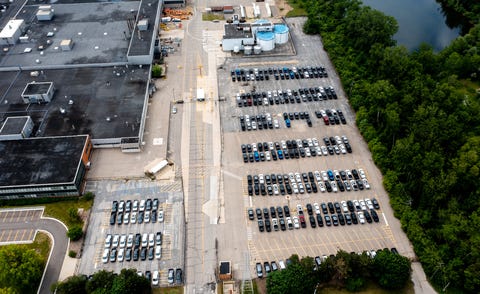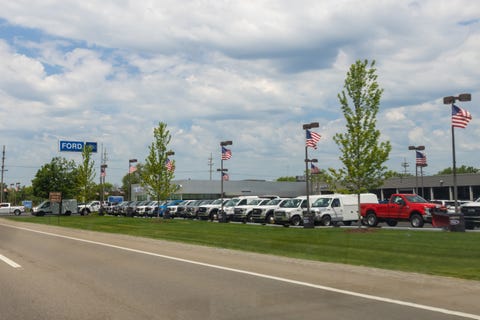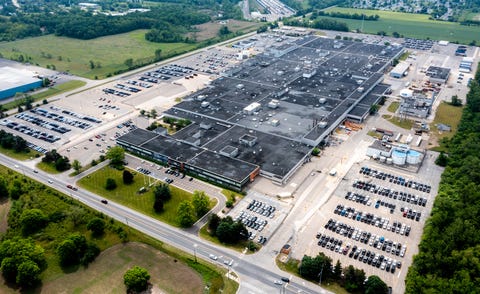
- The shortage of semiconductor chips for electronics has led to a shortage of cars and trucks on dealer lots ready to sell, and the top-selling vehicle in the U.S., the Ford F-150 pickup, has seen production delayed or halted on an equally large scale.
- We checked out a local high-volume Ford dealer, Varsity Ford, which has only a couple dozen new vehicles on a lot that normally has hundreds in stock.
- We also checked out the lots near Ford’s Rawsonville plant outside Detroit, where large numbers of F-150s and other vehicles sit parked, waiting for chips to come back in.
If you happen to live in the metropolitan Detroit area, as we do, you may have noticed that Ford has recently taken to storing large numbers of apparently completed F-150 trucks in parking lots across the city. But visit a Ford dealer, even a usually high-volume one like Varsity Ford in Ann Arbor, Michigan, which boasts on its website that “only Ford Motor Company has more” new Fords in stock than they do, and the scene looks different. “We have maybe 25 or 30 vehicles in inventory,” Varsity Ford assistant general manager Max Stanford told us this week, “and I’m probably overestimating.”
The rows of new trucks taking up space in usually empty lots in Detroit can’t make it to dealerships because they’re missing semiconductors that are essential to their operation. The problem has been going on for months and has impacted production plans at virtually every automaker. Ford decided in March to build F-150s without the ungettable chips, then trickle the trucks out to dealers (and customers) as the crucial parts come in. The scores of trucks parked across southeastern Michigan are awaiting chip installation and a final round of testing before they can be shipped to their new owners.
Stanford says his dealership usually keeps 1300 to 1500 vehicles in inventory. A storage facility that usually houses around 1100 of those vehicles is now completely empty, and the new cars that are coming into the dealership are already spoken for by customers who chose to order a new car to their specification and wait for it to be produced rather than picking from Varsity’s now extremely limited new-car inventory. Stanford says pre-ordered cars are taking priority on Ford’s manufacturing lines.
The shortage means Varsity Ford is now selling more cars than usual at MSRP, and the incentive programs Ford and other automakers have used in the past to clear out one model year’s inventory ahead of a fall changeover are nowhere to be found. Instead, Ford is offering incentives to lease customers who agree to extend their contract until the new-car shortage eases.
This is all good news for Varsity Ford’s used-car business, but it’s a tough time to be in new-car sales. “That’s the most difficult part of all this,” says Stanford of the strain on his non-salaried employees. But despite the challenges, Stanford says salespeople are sticking with Varsity Ford. “As a salesperson, even if you said forget Ford, I’m going to go sell a Chrysler or a Chevrolet, you’re in exactly the same situation.”
There are some signs that the chip shortage will abate by the end of the summer. General Motors said this week that it expects to be able to increase production numbers by July, and Stanford has been told to expect new inventory to start dribbling in by August. But chipmaker Intel says it could be years before the semiconductor shortage is fully resolved.
These extreme shortages could have caused tensions between Ford and its dealers or dealers and their customers. But Stanford says that while he hopes Ford might re-evaluate some of its just-in-time manufacturing practices to fend off future crises, the company has treated its dealers well and remained communicative throughout the shortage. And customers are behaving themselves, too. The coronavirus pandemic has “caused everyone to slow down and be more patient,” he says. “People have taken a step back—it’s not the end of the world if I extend my lease a few months.” And he has an answer for prospective buyers who inquire about the lots full of apparently road-ready F-150s scattered across Detroit: “We could sell you one, but you’d have to push it around.”
This content is imported from YouTube. You may be able to find the same content in another format, or you may be able to find more information, at their web site.
This content is imported from {embed-name}. You may be able to find the same content in another format, or you may be able to find more information, at their web site.
This content is created and maintained by a third party, and imported onto this page to help users provide their email addresses. You may be able to find more information about this and similar content at piano.io
Source link








